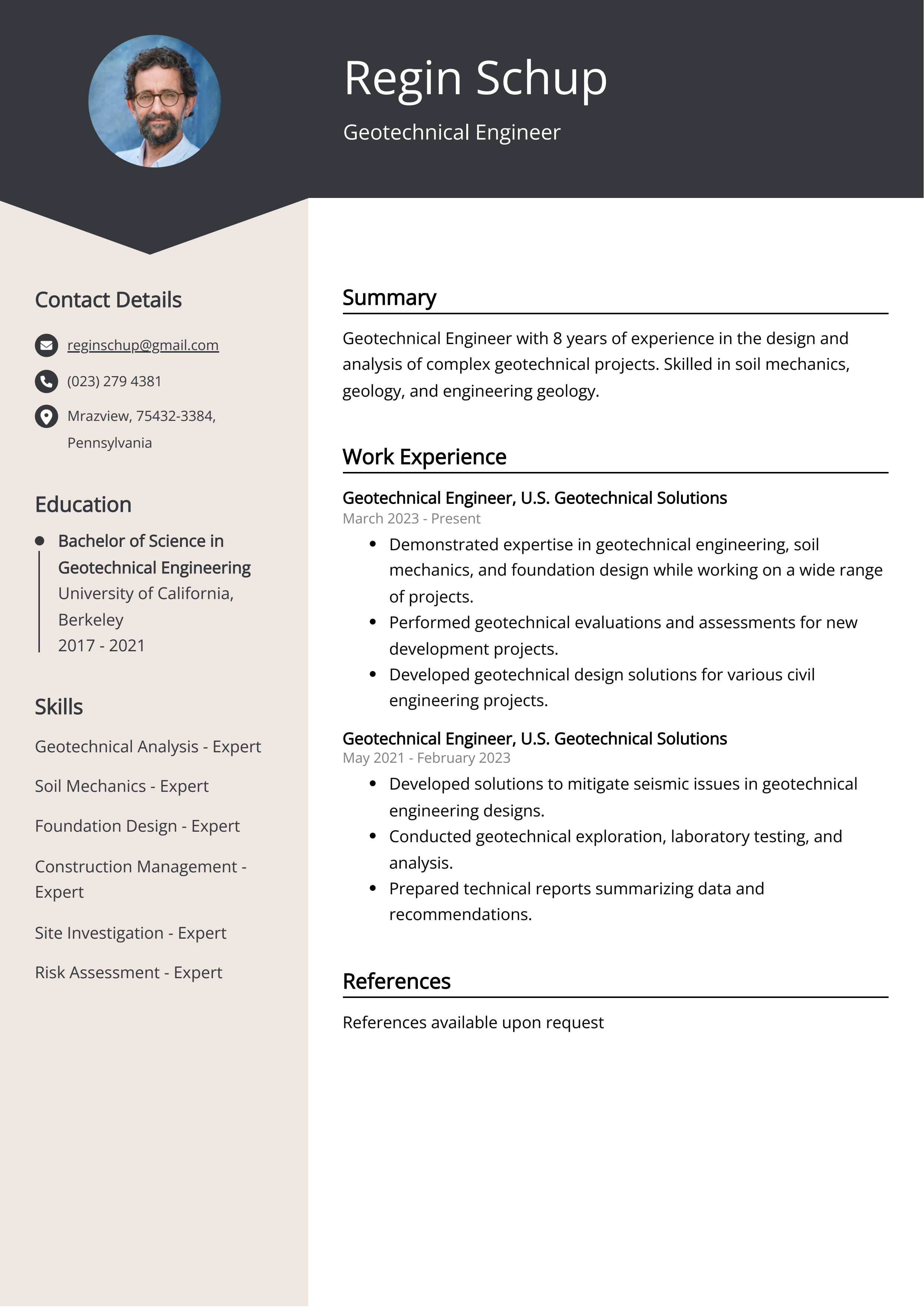The smart Trick of Geotheta That Nobody is Discussing
The smart Trick of Geotheta That Nobody is Discussing
Blog Article
Geotheta for Beginners
Table of ContentsTop Guidelines Of GeothetaThe smart Trick of Geotheta That Nobody is DiscussingSome Known Incorrect Statements About Geotheta The 4-Minute Rule for GeothetaWhat Does Geotheta Mean?

They conduct site examinations, collect samples, carry out lab examinations, and assess information to evaluate the viability of the ground for construction jobs - Geo Tech Engineer. Based upon their findings, geotechnical engineers supply recommendations for foundation design, slope stability, preserving frameworks, and mitigation of geotechnical risks. They work together with various other professionals, such as engineers, architectural designers, and building and construction teams, to make certain that geotechnical considerations are integrated into the overall project style and application
By evaluating the actions and buildings of soil and rock, they can recognize potential geotechnical threats such as landslides, soil negotiation, or slope instability. Their competence assists avoid failings or mishaps that can threaten lives and residential property. Right here are some detailed duties and obligations of a geotechnical designer: Website Investigation: Geotechnical designers conduct site investigations to gather data on subsurface problems.
They translate the data to recognize the residential properties and actions of the soil and rock, including their stamina, leaks in the structure, compaction qualities, and groundwater problems. Geotechnical Analysis and Style: Geotechnical engineers evaluate the information gathered during site examinations to analyze the security and viability of the website for building tasks. They perform geotechnical computations and modeling to examine elements such as bearing capability, negotiation, incline stability, side planet stress, and groundwater circulation.
The Greatest Guide To Geotheta
Structure Style: Geotechnical engineers play an important duty in making foundations that can securely sustain the designated framework. They evaluate the soil conditions and tons needs to identify the proper structure type, such as shallow structures (e.g., footings), deep foundations (e.g (https://telegra.ph/Why-Geotheta-is-Your-Go-To-for-Geotechnical-Engineers-in-South-Africa-08-02)., heaps), or specialized methods like soil renovation. They consider variables such as settlement limitations, bearing capacity, and soil-structure interaction to develop optimum structure layouts
They assess building strategies, display site tasks, and perform field evaluations to confirm that the design referrals are adhered to. If unanticipated geotechnical issues occur, they evaluate the scenario and give referrals for remediation or modifications to the layout. Danger Assessment and Reduction: Geotechnical designers evaluate geotechnical hazards and dangers connected with the task site, such as landslides, liquefaction, or dirt disintegration.

Cooperation and Communication: Geotechnical engineers function very closely with various other professionals associated with a task, such as architects, structural engineers, and construction teams. Reliable communication and collaboration are vital to integrate geotechnical factors to consider into the general job design and construction procedure. Geotechnical designers provide technical competence, answer questions, and ensure that geotechnical demands are satisfied.
Geotheta Fundamentals Explained
Here are some sorts of geotechnical designers: Foundation Designer: Structure designers concentrate on developing and examining foundations for structures. They analyze the dirt conditions, lots needs, and site features to establish one of the most ideal structure kind and style, such as shallow structures, deep foundations, or specialized techniques like heap structures.
They assess the aspects influencing incline security, such as soil residential properties, groundwater problems, and slope geometry, and create methods to avoid slope failures and reduce threats. Earthquake Designer: Quake engineers focus on analyzing and designing structures to hold up against seismic forces. They analyze the seismic threat of a site, review soil liquefaction possibility, and create seismic layout criteria to guarantee the security and strength of frameworks throughout quakes.
They perform area testing, collect samples, and assess the gathered data to identify the soil properties, geologic developments, and groundwater problems at a website. Geotechnical Instrumentation Designer: Geotechnical instrumentation engineers concentrate on monitoring and determining the behavior of dirt, rock, and frameworks. They set up and maintain instrumentation systems that keep an eye on elements such as soil negotiation, groundwater levels, incline movements, and structural displacements to assess performance and give early cautions of possible issues.
Getting The Geotheta To Work
They conduct examinations such as triaxial tests, consolidation examinations, straight shear examinations, and permeability tests to gather data for geotechnical analysis and design. Geosynthetics Engineer: Geosynthetics designers concentrate on the design and application of geosynthetic materials, such as geotextiles, geogrids, and geomembranes. They utilize these products to improve soil stability, strengthen inclines, offer water drainage solutions, and control disintegration.
They have a tendency to be investigatory people, which indicates they're intellectual, reflective, and curious. They are curious, systematic, sensible, logical, and sensible. Some of them are also social, implying they're kind, generous, cooperative, patient, caring, handy, compassionate, skillful, and friendly - Geotechnical visit our website Engineers.
In the office atmosphere, geotechnical designers make use of specialized software program tools to carry out computations, develop styles, and analyze data. They prepare reports, testimonial job requirements, interact with customers and team members, and coordinate task activities. The office setup gives a conducive environment for study, analysis, and collaboration with various other professionals associated with the job.
The Main Principles Of Geotheta
They frequently visit job sites to conduct site investigations, evaluate geotechnical conditions, and collect information for analysis. These check outs involve taking a trip to various locations, sometimes in remote or challenging terrains. Geotechnical designers might do soil sampling, conduct tests, and monitor building activities to make sure that the geotechnical elements of the project are being carried out appropriately.
Geotechnical engineers additionally function in specialized geotechnical labs. In these facilities, they perform experiments, perform examinations on soil and rock examples, and evaluate the design buildings of the materials. Geotechnical lab engineers function thoroughly in these environments, taking care of testing equipment, operating instruments, and videotaping information. They team up with various other research laboratory personnel to make certain accurate and dependable screening results.
Report this page